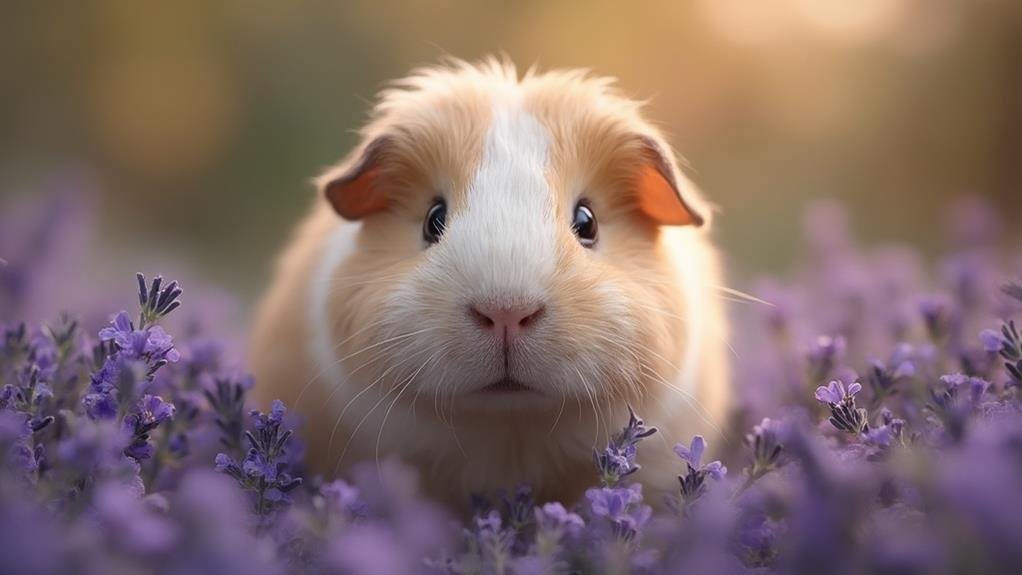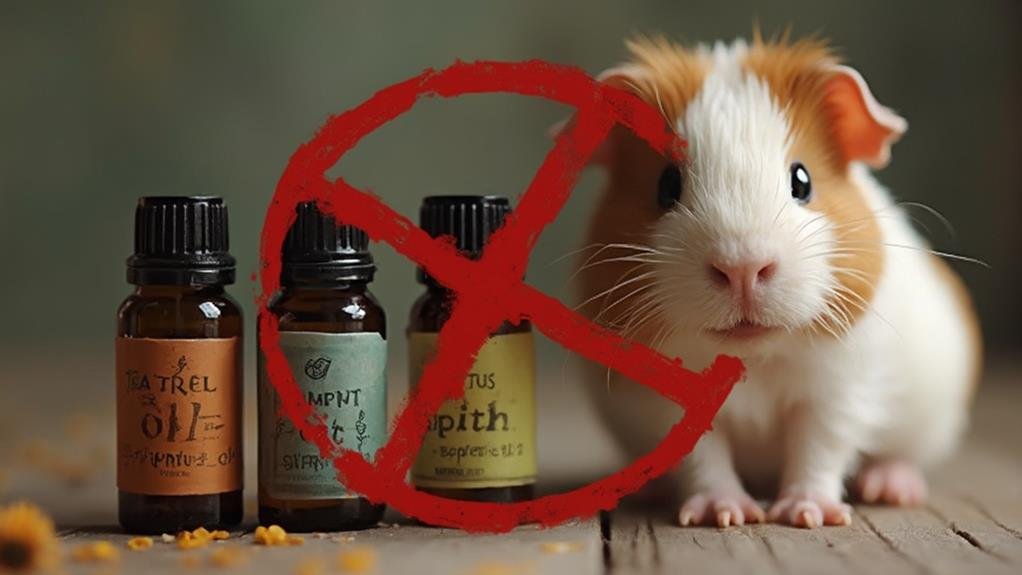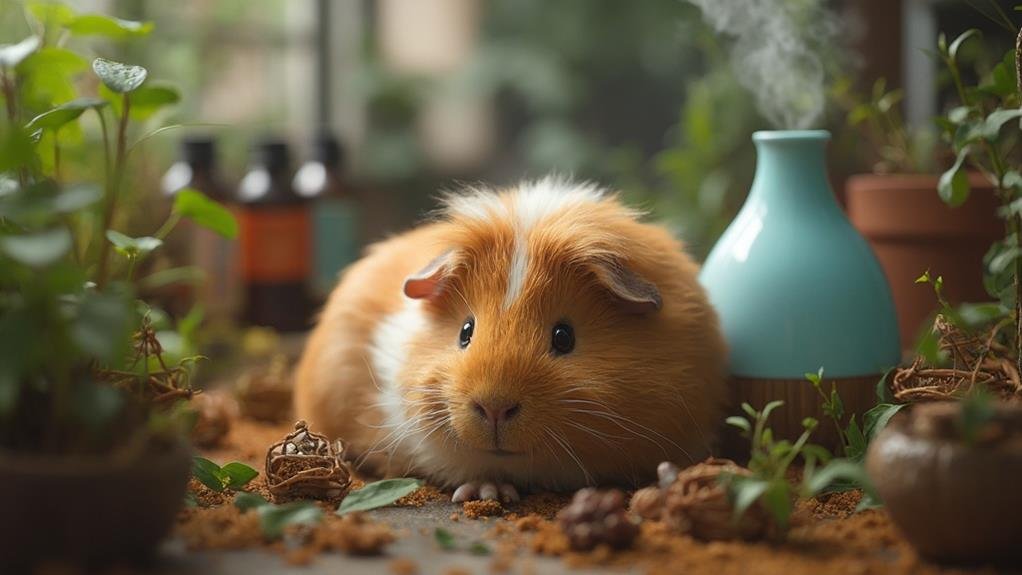Are Essential Oils Safe for Guinea Pigs?
Essential oils are not safe for guinea pigs if they are directly exposed. Guinea pigs have extremely sensitive respiratory systems and can suffer from respiratory distress, skin irritation, and even organ damage when exposed to certain essential oils.
Certain essential oils are particularly dangerous for guinea pigs and should be avoided:
- Citrus
- Tea tree
- Eucalyptus
Potentially Safe Oils with Caution

While some oils like lavender and chamomile may offer benefits, they must be used with caution. Always ensure proper dilution and ventilation to minimize risks.
Lavender Oil
Lavender oil can create a calming atmosphere when used in a 1-2% dilution with a carrier oil such as coconut or jojoba oil (source). However, avoid direct contact with the guinea pig’s skin or fur.
Chamomile Oil
Chamomile oil can also promote relaxation and reduce stress. It should be diluted similarly to lavender oil and used in well-ventilated areas (source).
Key Safety Guidelines
Here are some safety measures that you need to take:
- Monitor for Symptoms: Watch for signs of distress such as coughing or sneezing. Discontinue use immediately if any adverse effects are observed. Always consult a veterinarian before introducing any essential oils to your guinea pig’s environment.
- Avoid Direct Exposure: Do not apply essential oils directly on your guinea pig or near its face.
- Proper Dilution: Use only a small amount (1-2 drops) mixed with a carrier oil to reduce potency.
- Ensure Ventilation: Use essential oils in a well-ventilated space to prevent harmful vapors from accumulating.
Understanding Guinea Pig Sensitivities

Guinea pigs have a highly developed sense of smell, making them sensitive to strong scents which can lead to stress and anxiety. Their unique physiology, including limited liver function, makes it difficult for them to metabolize and eliminate toxins.
Risks Associated with Essential Oil Use
- Toxin Accumulation
- Respiratory Problems
- Skin Irritation and Allergic Reactions
Read more in this article by Healthline.
Toxic Oils to Avoid

Some essential oils are highly toxic to guinea pigs:
- Tea Tree Oil: Contains cineole; highly toxic and can cause severe reactions.
- Peppermint Oil: Can cause skin irritation and respiratory issues.
- Eucalyptus Oil: Contains eucalyptol; can cause respiratory problems.
- Geranium Oil: Can interfere with hormonal balance.
Safe Ways to Use Essential Oils
Here are some safe ways to use essential oils that need to be followed:
Methods of Application
- Diffuser: Use a diffuser specifically designed for aromatherapy with animals.
- Bedding or Hiding Places: Add a few drops of diluted essential oil.
- Surface Spray: Mix with water and spray in the air or on surfaces.
Guidelines for Specific Oils
- Lavender Oil: Dilute in a carrier oil at a 1-2% concentration. Apply to bedding or use as a surface spray.
- Chamomile Oil: Similar dilution and application methods as lavender oil.
Summary of Safe and Toxic Oils
| Essential Oil | Safety for Guinea Pigs | Notes |
|---|---|---|
| Lavender Oil | Generally Safe | Use in 1-2% dilution; avoid direct contact with skin/fur. |
| Chamomile Oil | Generally Safe | Effective for relaxation; use in diluted form. |
| Tea Tree Oil | Unsafe | Contains cineole; highly toxic and can cause severe reactions. |
| Peppermint Oil | Unsafe | Can cause skin irritation and respiratory issues. |
| Eucalyptus Oil | Unsafe | Contains eucalyptol; can cause respiratory problems. |
| Geranium Oil | Unsafe | Can interfere with hormonal balance; use with caution. |
Precautions for Specific Oils
Here are some precautions to be taken while dealing with toxic oils:
Tea Tree Oil
Avoid altogether due to its high concentration of cineole, which can cause severe reactions.
Eucalyptus Oil
Highly risky due to its potential to cause respiratory problems. Symptoms of inhalation include wheezing, coughing, and difficulty breathing.
Peppermint Oil
Can be overwhelming due to its intense aroma. Risks include skin irritation and stress. Always dilute and use in moderation.
Natural Alternatives for Aromatherapy
Consider using herbs like chamomile, lavender, and lemon balm in their fresh or dried form as safer alternatives. Pheromone products specifically designed for guinea pigs and calming music or white noise can also promote relaxation.
Frequently Asked Questions
Can Guinea Pigs Develop Allergies to Essential Oils Over Time?
Yes, guinea pigs can develop allergies or sensitivities over time. Signs include changes in appetite, skin irritation, sneezing, and increased stress. Discontinue use if these signs are observed and consult a veterinarian.
Are Essential Oils Safe for Baby Guinea Pigs or Pregnant Sows?
Using essential oils around baby guinea pigs or pregnant sows is not recommended due to their sensitive systems. Consult a veterinarian for safer alternatives.
Can I Use Essential Oils on Guinea Pigs With Skin Conditions?
Always consult a veterinarian before applying essential oils on guinea pigs with skin conditions. Start with small, diluted amounts to test for any adverse reactions.
How Often Can I Use Essential Oils Around Guinea Pigs Safely?
Limit exposure to brief, infrequent periods (5-10 minutes). Always monitor your guinea pigs for signs of distress and consult a veterinarian if adverse reactions are noticed.
Can Guinea Pigs Ingest Food Treated With Essential Oils Safely?
No, guinea pigs should not ingest food treated with essential oils as it can cause toxicity and digestive issues. Always check food labels and opt for safe alternatives like hay or fresh vegetables.
Conclusion
Guinea pigs are sensitive to strong scents and essential oils require careful selection and use. To promote a calming environment, choose gentle oils like lavender and chamomile.
Always dilute the oils, ensure proper ventilation, and avoid direct contact. Prioritize your guinea pig’s health and well-being by following these guidelines.







